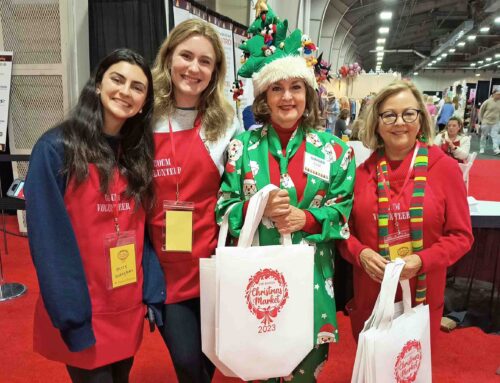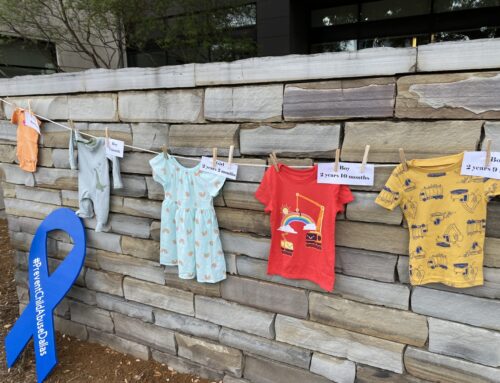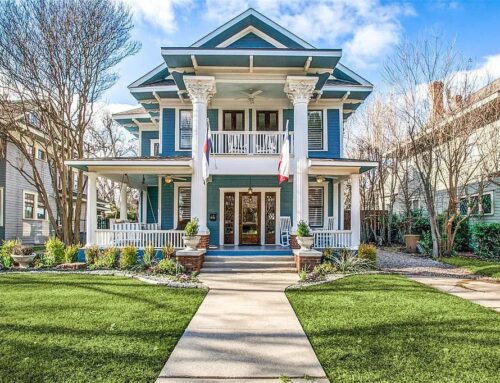Vickie Thompson
If you run into Vickie Thompson, don’t expect her to have much time to chat. Chances are she’s on her way to a meeting.
And don’t ask her about herself.
She won’t tell you her age, or many other personal details for that matter, and she certainly won’t brag about her tireless work for our neighborhood.
She would rather ask the questions and recruit you to help a neighborhood cause.
“She’s the type of person who always puts others before herself. She really walks the walk,” says Nora Tomlin, executive director of the East Dallas YMCA, and organization for which Thompson volunteers.
“If you could plug Vickie into a wall socket, you could probably light up the whole town of Las Vegas. She has the kind of energy that doesn’t drain you. It recharges everyone around her.
“Vickie demonstrates to the group that if you believe in something, you can make things happen in your community.”
A full-time mom and full-time volunteer, Thompson has her hands into everything. She participates in Lakewood Elementary’s PTA (as president); J.L. Long Middle School’s PTA; the Lakewood Service League; the Junior League of Dallas; and Ridgewood Park United Methodist Church’s staff parish committee, which oversees church administration.
Fund-raising for the East Dallas YMCA, which Thompson has done for three years, is one of her biggest projects. This year, she and neighborhood resident Milo Segner are chairing the 1996 Partners with Youth Campaign, which will try to raise $57,000 from Jan. 22 to Feb. 23 to fund scholarships for low-income families who otherwise wouldn’t participate in Y programs.
She and Segner also chaired last year’s scholarship campaign, which was the most successful in the Y’s history, raising $55,000.
Thompson’s neighborhood volunteer work began when she joined the Lakewood Early Childhood PTA, of which she is a past president, and snowballed from there.
Her first child, Jennifer, now 13 years old and a seventh grader at Long, was born a little more than a year after Thompson and her husband, John, a pilot for Southwest Airlines, moved to our neighborhood. They came from North Carolina in 1981. The couple also has an 11-year-old son, Johnathan, a fifth grader at Lakewood Elementary.
Thompson often brings her children along when she volunteers.
“I want to teach them to have respect for and to be kind to others,” she says.
Prior to the birth of her children, Thompson was a church organist and a social worker who assisted the poor, the elderly, alcoholics and drug addicts.
She attended college in the University of North Carolina system for eight years, first earning a bachelor’s degree in music, then a bachelor’s degree with a double major in sociology and psychology, and finally a master’s degree in social welfare.
Thompson quit social work when she started her family because she says the emotional stress came home with her. But she couldn’t give up helping people.
“Once you get into social work, it gets in your blood,” she says. “That’s why I do all this stuff.
“It’s for the betterment of our community. It’s for our kids. It’s for our future.”
One of Thompson’s favorite ways to help people is singing in the Dallas Junior League’s musical therapy choir, which visits care facilities for the elderly, disabled and sick.
“It really warms the heart when you leave knowing you’ve brightened someone’s day,” Thompson says. “I enjoy putting smiles on people’s faces.”
Steve Halbach
Steve Halbach, 31, seems like most bachelors his age.
He works a full-time job, spends his mornings in the gym and socializes with friends on the weekends.
But his weekend pals aren’t what you might expect. One is 92 years old, and another is 78.
Halbach volunteers for Eldercare, a program run by the Visiting Nurse Association of Texas.
Eldercare provides in-home support to elders living on their own. The program is designed to help senior citizens maintain their independence and to assist working people with elderly family members.
Halbach takes his two elderly friends to the grocery store and to doctor appointments when their families are unable to do so. He also talks to them on the phone, pfovdes companionship and performs miscellaneous chores. All the things a grandson might do.
“He’s a very caring individual and has a great deal of respect for the elderly,” says Eldercare Director Suzanne Sugalski. “Without people like Steve, we wouldn’t have a program.
“The program gives elderly people the feeling that they’re worthwhile. It boosts their self-esteem and enables them to stay in their own home. To give a couple of hours means so much to them.”
The majority of Halbach’s volunteering is done on weekends because of his weekday job at Black-Eyed Pea on Greenville. Most Eldercare volunteers only have one client. Sugalski says, but even though Halbach’s time is limited, he has two.
“I work in a restaurant, and the nicest people I come across, the most sincere, are the older people,” Halbach says. “I’ve grown found of them.”
Halbach joined Eldercare in 1993, when he was a student at Richland College. A class he was taking during fall semester required him to volunteer. With a budding interest in gerontology, the study of aging, he looked into Eldercare.
The program dissolves stereotypes of the elderly Halbach says. When assigned his first client, Halbach was nervous and unsure how to act, he says, but he soon grew comfortable.
“A lot of people think you have to talk to an elderly person loud and slow, but I just talk to her like a normal person,” Halbach says.
Halbach’s involvement with Eldercare has strengthened his interest in home care for senior citizens, and he plans to return to school to pursue a gerontology degree at the University of North Texas, he says.
The study of aging is an important and needed field, he says, because of longer life spans and the increasing population of senior citizens.
Halbach grew up in North Dallas and Richardson and currently lives with his brother John in a neighborhood duplex. He’s the youngest of five sons in his family.
In addition to his Eldercare responsibilities, he also has helped the Visiting Nurse Association give vaccination, wrap holiday gifts for low-income senior citizens and distribute care packages.
But his main focus as a volunteer is the two women who depend on him.
“I hope I give them the sense that somebody cares for them,” Halbach says. “A lot of elderly people are avoided.
“Hopefully through me, they get a sense that somebody does think about them.”
Dusty Eagen
Dusty Eagen, 46, is fed up with litter and graffiti in her Old East Dallas neighborhood. She’s tired of hearing random gunfire at night while she tries to relax at home. She has decided to make a change.
“I’ve traveled for 20-years extensively, and I’ve seen what other cities throughout this country have done with revitalization,” Eagan says. “It angers me when people are not willing to put forth the effort to restore our older areas to the grandeur that they once were.
“Don’t just sit around and complain. Develop an action plan, put it into play and make a difference.”
A member of the Old East Dallas Renaissance Coalition, Eagen chairs the organization’s community projects committee. The coalition’s mission is to reverse a social and economic deterioration in the Old East Dallas area by focusing on crime prevention, economic opportunities, housing education and the delivery of social services.
Eagen’s committee plans and carries out monthly hands-on projects, from graffiti removal to alley litter removal. It also works with neighborhood schools and publishes a monthly newsletter.
This summer, Eagen organized a group of volunteers to paint over graffiti, mow grass and bag trash at Lipscomb Elementary.
The committee’s motto is “be a key to good neighborhoods.”
Eagen moved to our neighborhood five years ago and works in management at Olla Podrida Marketplace. Before, she spent a lot of time on the road as an executive for Banc One Services Corp.
Once back in Dallas, where she spent part of her childhood, she bought a home on Tremont that was scheduled to be demolished. Growing up, she watched her parents restore old homes and developed a passion for architecture.
She rebuilt her first Dallas house, but has since sold it. She and her boyfriend, Omar Gonzalez, a Dallas fireman, now live in another old neighborhood home, which they are nearly finished restoring.
“I never had cause to set down roots until I got a chance to come back home and buy a house,” Eagen says. “In buying that house, I needed to become connected and involved with my community.”
To learn more about crime prevention, one of Eagen’s main concerns, she went back to school. With a bachelor’s degree in management and marketing already under her belt from the University of Maine, Eagen obtained an associate’s degree in criminal justice from El Centro Community College.
Today, Eagen is a member of crime watch groups in Munger Place and Junius Heights and an alternate to the Dallas Police Chief Ben Click’s Crime Watch Executive Board, a networking group that brings together crime watch heads and police. She also attends meetings of the Gaston Avenue Apartment Managers Crime Watch because she says homeowners can’t just wish slumlords to disappear.
“Dusty fights a battle in East Dallas that many people have given up on. She wants East Dallas to be a place where everyone can feel safe,” says police officer Kevin King, the residential crime watch coordinator for the Dallas Police Department’s Central Division.
“If you give Dusty a project, you can count on it being done, but not just what you asked her to do. She’ll find avenues you haven’t even thought of. I think it’s refreshing to a lot of officers how straight forward she is.”
Eagen says homeowners, apartment managers and police officers must work together to better neighborhoods, and she calls many police officers her friends.
“If we’re going to regenerate, rejuvenate and regain respect for Old East Dallas, it’s going to take a tremendous effort and commitment from the residents and the police,” she says.
When you build a rapport with a cop, and you need him, he’s there for you. You’re no longer a 911 call.
“You’ve proven you’re willing to put forth the effort and be part of the solution.”
Russell Switzer
Russell Switzer’s beautification efforts are “small potatoes,” he says.
But if we all did as he does – spent five hours a week primping the block we live on – our neighborhood would be a prettier place to live.
When Swtizer isn’t caring for his wife, June, who is ill, this 82-year-old retiree cares for the parkway along Abrams between McCommas and Malcolm.
With a loving hand and a passion for gardening, Switzer tends to the trees, mows and waters the grass, pulls the weeds and picks up the trash on his block, so the rest of his neighbors can enjoy a cleaner environment.
“I decided I needed the exercise,” Switzer says. “I was kind of ashamed of it (the parkway). I wanted it to look decent, and nobody else was doing anything about it.”
Switzer has done this extra yard work religiously since 1983, when he moved to our neighborhood and joined the Lakewood Homeowners Association.
In the summer of 1994, Switzer decided to plant grass in unsightly dirt patches along Abrams with the help of friend and neighbor Ed Hoot, a retired dentist.
Switzer purchased top soil, pushed it in his wheelbarrow out to Abrams, and with his constant attention, made grass thrive where plants wouldn’t grow before.
“It’s a part of supporting the neighborhood. It’s like taking care of a mile on the highway,” Hoot says. “He (Switzer) is a very sincere person, very cooperative, and always willing to do his share or more.
“He really enjoys yard work. That seems to be his thing.”
Switzer’s yard work, though, has sometimes put him at odds with the City, he says.
The area Switzer tends is small, and the City’s tractor-sized lawn mowers tear it up, he says. Litter isn’t picked up before mowing, and as a result, Switzer says the large equipment shreds and scatters the garbage, leaving the area more trashed than before.
Switzer has discussed the problem with supervisors of the City’s lawn mowing service, but says he has made little headway.
A couple of years ago, neighborhood Realtors and homeowners made an organized effort to plant trees along our streets. Switzer and Hoot pulled hoses from their yards to water the trees on their block, adding expense to their water bills, and they cautioned City employees about mowing too close to the saplings. Switzer had seen the City knock down saplings before, he says.
In addition to these trees, Switzer has taken special care of the redbud tree next to his fence, which was planted several years ago.
“I had to stand guard over it while it was growing up,” he says. “Now that it’s big, they (City workers) don’t bother it anymore.”
Before Switzer retired, he was manager of training and development for Atlantic Richfield, where he met his wife, a neighborhood native who worked as a company secretary. June graduated from Woodrow Wilson High School in 1938 under the maiden name of Koonce.
Switzer grew up in a small Kansas town, where he tended his family’s garden.
Today, he grows tomatoes, bell peppers and cucumbers in his backyard, which he gives to neighbors and members of his church, Park Cities Baptist.
“I think it’s exciting to plant seeds and see them flower and grow,” he says. “It’s kind of therapy to get out there and work in the dirt. You’re dog-tired, but you feel good afterward.”
Carlin Morris
Carlin Morris, 42, is a full-time mom who cares for thousands of children.
Morris volunteers for the Wilkinson Center, a non-profit organization that provides clothing, food and employment assistance to low-income neighborhood families. The center is housed at Munger Place United Methodist Church, 5200 Bryan.
Morris founded the Wilkinson Center’s back-to-school shoe drive in 1987 and continues to organize it each year. The drive takes place in August and provides needy children with new pairs of shoes and socks. The children call Morris “the shoe lady”.
“The faces you see light up,” Morris says. “These children will always remember that someone helped them. At least they’ll start off the year feeling good about themselves.
“I’ve made a lot of little friends.”
Each summer, Morris spends two months soliciting money and recruiting volunteers for the shoe drive. She pays for mailing and fund-raising costs herself, using 100 percent of the donations to buy shoes and socks.
The first shoe drive benefited 500 children, and the numbers have increased annually. This summer, more than 1,100 children received shoes during the ninth drive, the most successful one so far.
Morris first heard about the Wilkinson Center through her church, Lakewood United Methodist. She began volunteering in the center’s clothing room, where she helped fit clients with shirts and pants and often saw parents come in with drawings of their children’s feet to find shoes.
“It drove me nuts to see them leave not knowing if the shoes would fit,” Morris says.
Today, Morris has teamed up with Payless Shoe Source on Lower Greenville, which joined the shoe drive effort in 1990, to properly fit children with shoes.
During the drive, which lasts 20 hours over a three-day period, children are given appointments to visit Payless, where volunteers serve them as if they were paying customers. In addition to turning over the store to Morris, Payless also offers discount pricing.
But the shoe drive is just the beginning of Morris’ devotions to children.
She also is a member of Woodrow Wilson High School’s and J.L. Long Middle School’s PTAs, is a past president of Lakewood Elementary’s PTA, and serves on Long’s School Centered Education Council.
“She’s got a lot of life in her,” says friend Pamela Wilson, who’s children attend school with Morris’ children. “She’s very dedicated to her neighborhood. She believes strongly in that. When she gets more to do, she just works faster.”
Morris’ daughter Caitlin, 15, is a freshman at Woodrow, and son Charlie, 13, is in the seventh grade at Long. At both schools, Morris helps with the musicals. Prior to the birth of her two children, she was a teacher.
Morris and her husband Charles also are chairing the 1996 Tim Brown Golf Tournament, which benefits Woodrow’s athletic programs.
The couple moved to Dallas after Charles graduated from the University of Virginia’s law school and was hired by a Dallas firm. When their daughter was born, Carlin joined the Lakewood Early Childhood PTA, then known as the Preschool PTA, and her career as a neighborhood volunteer began.
“I feel like I’ve given to a community that’s been good to us,” Morris says. “In order to make any community or school successful, you’ve got to put in time.”
“Volunteers are always needed. It makes me feel needed.”





